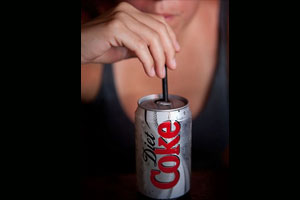- Home
- Editorial
- News
- Practice Guidelines
- Anesthesiology Guidelines
- Cancer Guidelines
- Cardiac Sciences Guidelines
- Critical Care Guidelines
- Dentistry Guidelines
- Dermatology Guidelines
- Diabetes and Endo Guidelines
- Diagnostics Guidelines
- ENT Guidelines
- Featured Practice Guidelines
- Gastroenterology Guidelines
- Geriatrics Guidelines
- Medicine Guidelines
- Nephrology Guidelines
- Neurosciences Guidelines
- Obs and Gynae Guidelines
- Ophthalmology Guidelines
- Orthopaedics Guidelines
- Paediatrics Guidelines
- Psychiatry Guidelines
- Pulmonology Guidelines
- Radiology Guidelines
- Surgery Guidelines
- Urology Guidelines
Consumption of diet soda linked to diabetic retinopathy

Singapore: It is a surprise Finding! Diet soda, not sugary soft drinks linked to diabetic retinopathy. Consumption of more than 4 cans of diet soda (1.5 L) per week is associated with a more than twofold risk of proliferative diabetic retinopathy (PDR) in diabetic patients, according to a new study published in the journal Clinical and Experimental Ophthalmology. PDR is a severe type of diabetic eye disease that can lead to blindness. This finding was independent of traditional risk factors for diabetic retinopathy, including diabetes control parameters and duration of diabetes.
The study is the first to evaluate the link between soft drink consumption and microvascular complications of diabetes.
The study evaluated a total of 609 adults; 73 had type 1 diabetes and 510 had type 2 diabetes, and 26 had unknown diabetes type, at a tertiary eye hospital between 2009 and 2010. The mean age of the participants was 64.6 years. They came from the Diabetes Management Project, a cross-sectional study of English-speaking adults with diabetes in Melbourne, Australia.
Participants underwent objective measurement of diabetic retinopathy and diabetic macular edema with standardized techniques to determine how soft drinks may affect microvascular complications of diabetes.
Participants self-reported soft drink consumption on a 145-question food frequency questionnaire. Of the total sample, 285 participants (46.8%) drank regular soft drinks, and 190 (31.2%) drank diet soft drinks.
Key Findings:
- Almost 146 participants (24%) had proliferative diabetic retinopathy.
- A total of 230 (37.8%), 36 (5.9%), 154 (25.3%), 28 (4.6%) and 146 (24.0%) had no DR, mild non-proliferative DR (NPDR), moderate NPDR, severe NPDR and proliferative DR (PDR), respectively.
- High diet soft drink consumption was independently associated with an increased likelihood of having PDR, compared to no consumption.
- In contrast, the regular, sugar-sweetened soft drinks was not associated with DR or DME.
The last result is consistent with past research, note the researchers. Some studies have found a link between consumption of diet soft drinks, but not regular soft drinks, and vascular complications of diabetes. Others have failed to confirm these findings. The authors mention several explanations for this discrepancy.
"Our finding that regular soft drink was not associated with increased risk of proliferative diabetic retinopathy could be due to the small numbers of high consumers. We had to merge the high-consumer category with the moderate-consumer category, and this may have masked the true relationship," Fenwick told Medscape Medical News.
"Although the results of our study must be interpreted within the context of several limitations, they add to the growing body of literature on the harmful effects of diet drinks on a range of health outcomes, including CVD [cardiovascular disease], diabetes, and metabolic syndrome," Fenwick said.
Because the study was cross-sectional, further longitudinal studies are needed to determine whether soft drinks are unhealthy alternatives to sugar-sweetened beverages, she added.
"Given that diet soft drinks are perceived as a healthy alternative to regular soft drinks, clinicians and patients should be aware that diet soft drinks may not be without risks of their own," she concluded.
For further reference follow the link: 10.1111/ceo.13154

Disclaimer: This site is primarily intended for healthcare professionals. Any content/information on this website does not replace the advice of medical and/or health professionals and should not be construed as medical/diagnostic advice/endorsement or prescription. Use of this site is subject to our terms of use, privacy policy, advertisement policy. © 2020 Minerva Medical Treatment Pvt Ltd